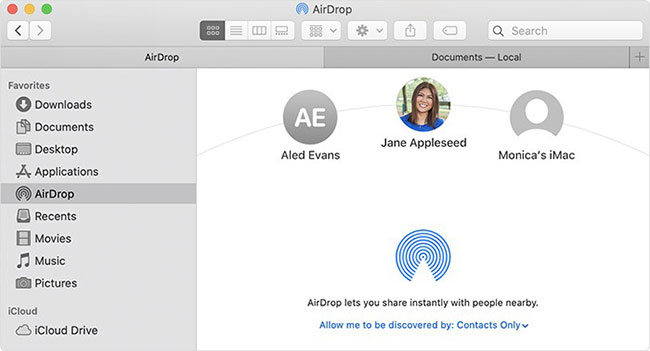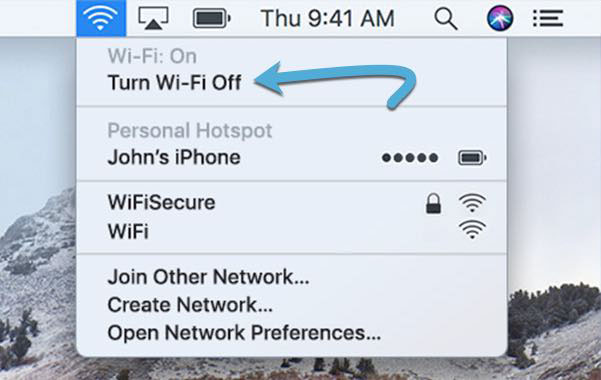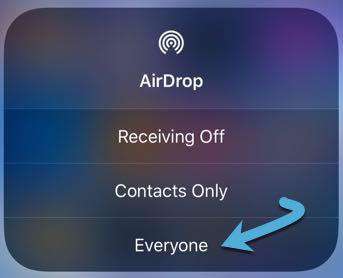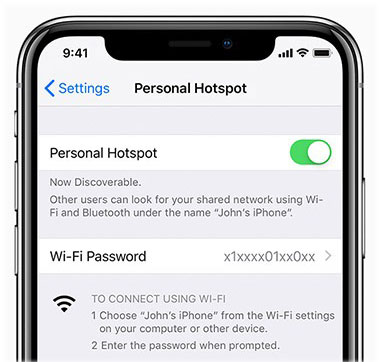How to fix AirDrop problems on Mac
AirDrop is a feature with no interface. It simply works or doesn't. Not many users know what to do when AirDrop crashes. Here are a few solutions that are often overlooked when AirDrop crashes on a Mac.
Is AirDrop turned on?
It sounds like this of course. But really take the time to check this out! You can check the AirDrop icon in the AirDrop tab of the Finder on macOS.

Is your device supported?
All new Apple devices are Airdrop enabled. However, make sure that your specific device is also included. The following is a complete list of supported devices:
AirDrop between Mac and iPhone or iPad:
- Macs from 2012 and older (excluding Mac Pro mid 2012) using OS X Yosemite or later
- iPhone, iPad, or iPod Touch using iOS 7 or later
AirDrop between Macs:
- MacBook Pro was introduced in late 2008 or later, except for MacBook Pro (17 inches, late 2008)
- MacBook Air was introduced in late 2010 and up
- MacBook introduced in late 2008 and later, excluding white MacBook (Late 2008)
- iMac was introduced in early 2009 onwards
- Mac Mini was introduced in mid 2010 and up
- Mac Pro was introduced in early 2009 (with an AirPort Extreme card) or mid-2010
- iMac Pro (all models)
Check network connection
To share files via AirDrop, both devices need to be on the same WiFi network. Check the network connection on both devices to make sure you use the same network.
What about the subnets on dual band routers that use 2.4GHz and 5GHz connections? These WiFi networks tend to start with the same name and end with their GHz value. In theory, the iPhone can be on a 2.4GHz network and the Mac is on a 5GHz network, but still share files successfully, since the networks are all created by the same router. But if AirDrop does not work, you can eliminate this cause, by connecting the devices to the same subnet.

If both devices are connected to the correct network, try restarting the WiFi connection. Turn off WiFi on both devices and wait at least 10 seconds before turning WiFi back on.
Check Bluetooth on device
AirDrop not only works over WiFi. It also requires active Bluetooth connection and activation on both devices. Check Bluetooth settings on both sending and receiving devices. If Bluetooth is off on either device, make sure to turn it on. However, you do not need to actually connect to the device by Bluetooth. Bluetooth connection is used passively, and does not actually pair with a device during data transfer.
If Bluetooth is turned on, you should disconnect any Bluetooth devices. Then restart Bluetooth connection by turning it off for about 10 seconds before turning it back on.
Wake and unlock device
If either device is in a sleep state, the connection may not be established easily. Whether or not the connection can be established depends on how deep the device is sleeping. For example, if your Mac has a screensaver turned on and doesn't need a password to exit the screensaver, AirDrop can often share files with that Mac. However, not always.
Wake up both devices from sleep mode and unlock them, enter a passcode or password when needed. On older Macs, it might be helpful to open the AirDrop tab in the Finder.
Set AirDrop to allow streaming from everyone
The default setting for AirDrop is to allow devices to be detected only by devices that are associated with Apple ID of contacts. But even a device owned by someone in your contacts may not be detected correctly, so it is better to disable this protection feature. Note that this only affects device detection, and does not affect data transmission.

Navigate to the AirDrop installation on the target device and select 'Everyone' . If this is already set, leave it that way. If this setting is "stuck" in the state of 'Receiving: Off' , it may be blocked in the parental control feature.
1. Navigate to Settings> Screen Time .
2. Click Content & Privacy Restrictions .
3. Select Allowed Apps.
4. Make sure the switch next to AirDrop is green.
Turn off Do Not Disturb and Personal Hotspot
The Do Not Disturb feature hides your device from incoming AirDrop connections. This way, you won't be bothered by connection requests or downloading files. However, it's easy to forget to turn off Do Not Disturb.

You also need to turn off Personal Hotspot on your iOS device. Because this feature is exclusively connected to WiFi, AirDrop cannot be used on a device that has Personal Hotspot enabled. Please turn off Personal Hotspot, then try resharing AirDrop.